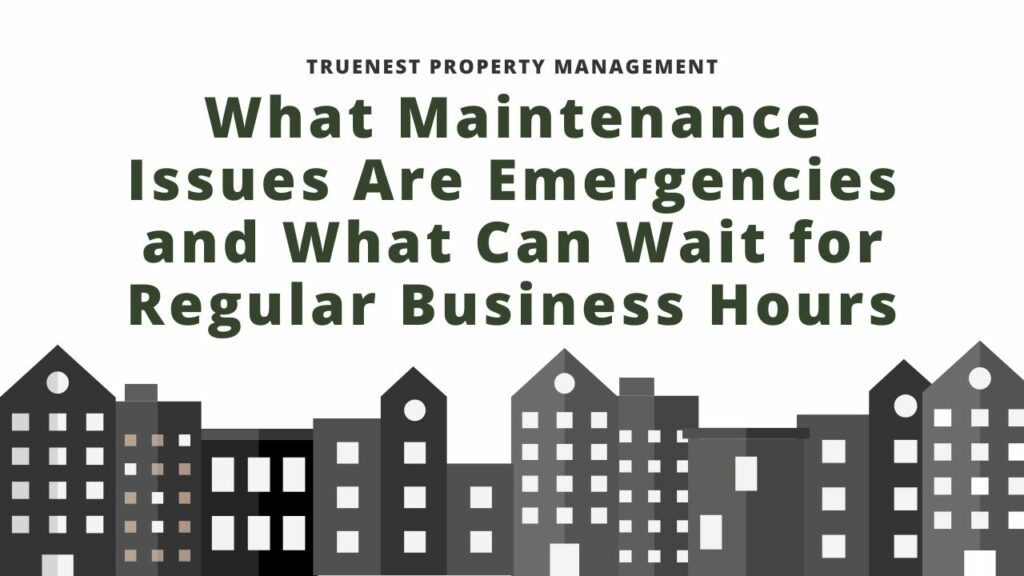What Maintenance Issues Are Emergencies and What Can Wait for Regular Business Hours

Managing a rental property may mean having to work outside of regular business hours. There may be emergency maintenance tasks to perform outside of the normal 9 to 5.
Since not all maintenance requests are considered emergencies, it’s important to know how to distinguish normal maintenance issues from ones that require an urgent response. Managing emergencies effectively can build your renters’ trust in you and attract long-term tenants to your rental units.
Defining a Maintenance Emergency
A situation can be labeled as an emergency if it could lead to risking the health or safety of people, or if it has the potential for injury, or grave property damage.
Review the list below to find examples of situations that can be categorized as an emergency:
- Fire
- Flooding
- Frozen pipes
- Broken doors and locks that can’t be secured
- Sewer backup
- Broken heater during winter
- Broken air conditioning during a heat wave
- Electrical issues
- Leaking roof
Scenarios That Are Not Considered a Maintenance Emergency
Evaluate if a situation threatens anyone’s health and safety. Would it result in severe property damage? If not, the situation doesn’t need to be labeled an emergency, and the issue can be resolved during normal business hours.
See the list below to learn what circumstances are not considered emergencies:
- Appliances that malfunction
- Lack of hot water available
- Lack of air conditioning (when outside temperature shows below 90 degrees)
- Lack of heat (when outside temperature displays below 50 degrees outside)
- Noise complaints
- Minor leaks

Dealing with Rental Property Emergency Maintenance
Landlords should always strive to cultivate good relations with tenants. They should also aim to respond to their renters’ requests promptly and appropriately. Learning how to manage maintenance emergencies can help keep renters happy, and it motivates them to sign a lease renewal in your rental unit.
Here are some essential tips for handling emergency maintenance in your rental home:
Be within Reach
Renters seek landlords they can easily contact, especially when emergencies arise. They want someone to direct them on what to do and provide essential updates. Ensure you can easily be reached by the residents.
Have the Contact Information for Emergency Services Ready
Although tenants are expected to know the emergency contact numbers of the police, fire, and utility services, it’s recommended that landlords prepare a list of vendors or services that can be immediately contacted to handle critical situations, such as leaks, frozen pipes, flooding, or broken heaters.
When you’re fully prepared with solutions to urgent circumstances, you can deal with the situation calmly and quickly decide what actions to take.
Practice Open Communication
Speak regularly with tenants. If an emergency arises and you schedule repairs, continuously give the tenants updated information and detailed instructions.

Be Understanding
When you welcome new renters, it’s possible they may not know how to categorize a situation as an emergency and may contact you past normal business hours. Be patient if it doesn’t call for an emergency response. Inform the renters that the situation will be handled in the morning, after they send a request for property maintenance.
Remember to try to understand the renters’ side, as they may be worried and may feel uncomfortable facing the situation without proper guidance from you.
Creating an Emergency Maintenance Vendor Network
Running a successful rental property requires landlords to have reliable vendor relationships so that when an emergency strikes, they can contact a provider whose services are well-vetted. Prior to selecting which vendor to work with, it’s recommended you screen them thoroughly.
Factors to check when considering potential vendors to partner with:
- Vendor reputation: Review the vendor’s performance by reading reviews online and checking out referrals. Pick vendors that have solid experience with your rental property type.
- Insurance coverage: Research if vendors have ample coverage and whether you’ll be protected in terms of legal, medical, or damage expenses. Request prospective vendors to submit a Certificate of Coverage before hiring them.
- Understand the relationship between timeline and cost: Keep away from overpaying vendors that don’t complete the job within the scheduled time. An excellent vendor provides an estimated completion date and finishes the work on or before the deadline.

Engaging the Services of a Property Management Company
Just like with qualifying vendors, it’s crucial to select the right property manager. Check the following factors to make sure that you’ll end up making the right decision.
- Area of expertise: Different companies will specialize in different property types. You should find one with expertise in managing your rental property type.
- Their support staff: Having extra sets of helping hands can make your rental operation more efficient. Research what kind of staff support the companies have and offer, such as administrative personnel and maintenance staff.
- Property management services offered: Assess the services provided and the fees charged by each property management company.
Bottom Line
If you’re looking for a reliable property manager to supervise your rental space, get in touch with TrueNest Property Management today! We offer high-quality property management services, such as marketing, tenant screening, rent collection, and property maintenance.
